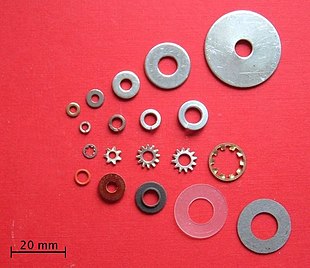**Types of Washers:**
– Plain washers
– Spring washers
– Locking washers
– Countersunk washers
– Tooth lock washers
**Specialized Washer Types:**
– Belleville washer
– Split washer
– Gaskets (including shoulder washers, crush washers, electrically insulating grommets, and Dowty washers)
– Keps nut or K-lock nut
– Self-aligning washer
– Top hat washer
– Insulating shoulder washer
– Torque-limiting washer
**Materials Used in Washers:**
– Steel, non-ferrous metals, alloys, plastics, nylon, and specialty materials
– Phenolic washers
– Fibers, ceramics, rubber, felt, leather, bimetals, and mica
– Nylon variants (Nylon 6, Nylon 66, Nylatron, Tecamid MDS)
– Alloy materials (Silicon bronze, Inconel, Monel, Hastelloy)
**Corrosion Resistance Techniques:**
– Metallic coatings (zinc, cadmium, nickel)
– Electroplating (chromium, silver)
– Phosphating
– Chemical plating (nickel-phosphor alloy)
– Alloy boat corrosion prevention methods
– Use of Teflon PTFE washers
– Nylon spacers and washers
**Standards and Specifications:**
– ANSI standards for flat washers (Type A and Type B)
– British Standard for Metric Series Metal Washers (BS4320)
– DIN standards for industrial fasteners (e.g., DIN 125 Flat Washers)
– SAE recommendation against lock washers in critical applications
– Specific standards for different types of washers (ASME B18.21.1-1999, IS 3063:1994)
A washer is a thin plate (typically disk-shaped, but sometimes square) with a hole (typically in the middle) that is normally used to distribute the load of a threaded fastener, such as a bolt or nut. Other uses are as a spacer, spring (Belleville washer, wave washer), wear pad, preload indicating device, locking device, and to reduce vibration (rubber washer).

Washers are usually metal or plastic. High-quality bolted joints require hardened steel washers to prevent the loss of pre-load due to brinelling after the torque is applied. Washers are also important for preventing galvanic corrosion, particularly by insulating steel screws from aluminium surfaces. They may also be used in rotating applications, as a bearing. A thrust washer is used when a rolling element bearing is not needed either from a cost-performance perspective or due to space restraints. Coatings can be used to reduce wear and friction, either by hardening the surface or by providing a solid lubricant (i.e. a self-lubricating surface).
The origin of the word is unknown. The first recorded use of the word was in 1346; however, the first time its definition was recorded was in 1611.
Rubber or fiber gaskets used in taps (or faucets, valves, and other piping connections) as seal against water leaks are sometimes referred to colloquially as washers; but, while they may look similar, washers and gaskets are usually designed for different functions and made differently.
